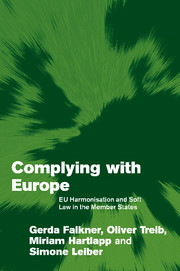Book contents
- Front matter
- Contents
- List of figures
- List of tables
- Preface
- 1 Introduction: flexible EU governance in domestic practice
- 2 Theorising the domestic impact of EU law: the state of the art and beyond
- 3 EU social policy over time: the role of Directives
- 4 The Employment Contract Information Directive: a small but useful social complement to the internal market
- 5 The Pregnant Workers Directive: European social policy between protection and employability
- 6 The Working Time Directive: European standards taken hostage by domestic politics
- 7 The Young Workers Directive: a safety net with holes
- 8 The Parental Leave Directive: compulsory policy innovation and voluntary over-implementation
- 9 The Part-time Work Directive: a facilitator of national reforms
- 10 Voluntary reforms triggered by the Directives
- 11 The EU Commission and (non-)compliance in the member states
- 12 Beyond policy change: convergence of national public–private relations?
- 13 Implementation across countries and Directives
- 14 Why do member states fail to comply? Testing the hypotheses suggested in the literature
- 15 Three worlds of compliance: a typology
- 16 Conclusions: myth and reality of social Europe
- References
- Index
2 - Theorising the domestic impact of EU law: the state of the art and beyond
Published online by Cambridge University Press: 22 September 2009
- Front matter
- Contents
- List of figures
- List of tables
- Preface
- 1 Introduction: flexible EU governance in domestic practice
- 2 Theorising the domestic impact of EU law: the state of the art and beyond
- 3 EU social policy over time: the role of Directives
- 4 The Employment Contract Information Directive: a small but useful social complement to the internal market
- 5 The Pregnant Workers Directive: European social policy between protection and employability
- 6 The Working Time Directive: European standards taken hostage by domestic politics
- 7 The Young Workers Directive: a safety net with holes
- 8 The Parental Leave Directive: compulsory policy innovation and voluntary over-implementation
- 9 The Part-time Work Directive: a facilitator of national reforms
- 10 Voluntary reforms triggered by the Directives
- 11 The EU Commission and (non-)compliance in the member states
- 12 Beyond policy change: convergence of national public–private relations?
- 13 Implementation across countries and Directives
- 14 Why do member states fail to comply? Testing the hypotheses suggested in the literature
- 15 Three worlds of compliance: a typology
- 16 Conclusions: myth and reality of social Europe
- References
- Index
Summary
The implementation of EU Directives is but one example of the broader phenomenon of ‘Europeanisation’. This term has become a catchword in recent political science literature, referring to a number of slightly different phenomena that are located on at least four different levels. First, the term is a times used to refer to the EU-level development of policies and/or policy networks (e.g. Risse et al. 2001). Second, it can mean the reactions in domestic systems to top-down influences from the EU level, be they directly induced by EU law or indirectly by European policies such as the Maastricht convergence criteria (e.g. Ladrech 1994; see also Radaelli 2000). Third, Europeanisation is used to point out changes at the national level induced by transnational influences (Kohler-Koch 2000a). Finally, some authors take a very broad view and include the sum of all of these notions/levels in their understanding of Europeanisation (e.g. Borzel 1999; Falkner 2000b). For the purpose of this book, we shall adopt the top-down perspective as referred to by Robert Ladrech, andwe will try to isolate, as far as possible, the effects stemming from EU politics and (social) policy from other aspects included in some of the concepts mentioned above.
Research on Europeanisation – even if understood in this comparatively more narrow sense – targets a broad and complex phenomenon since all parts of the domestic political system may be affected (i.e. policies, politics, and polities).
- Type
- Chapter
- Information
- Complying with EuropeEU Harmonisation and Soft Law in the Member States, pp. 11 - 40Publisher: Cambridge University PressPrint publication year: 2005

